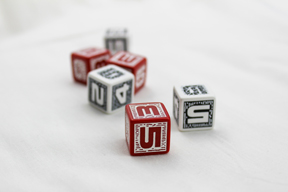Game Design September: Getting Started

Are you a game designer? (Hint: anyone can be one!) Starting today, we'll spend a month talking about game design for aspiring and experienced creators alike. This is the first post in that series, with insights from Jeff Tidball, a veteran game designer and producer, as well as Atlas Games' COO. Have a question for Jeff? Give us a mention on Twitter @AtlasGames. Today's topic: getting started.
How does one put the first foot forward when wanting to write a game? — Aaron (@AaronCantanoSaez)
Getting started is hard. And not just when writing games. It’s hard for every kind of virtuous, creative, or self-improving endeavor. That’s the bad news. The good news is that since the issue is so widespread, lots of people have given lots of good advice about it that we can steal in order to overcome inertia and get started writing games.
The key thing to remember is that action precedes motivation, rather than the other way around. The first time someone told me this I assumed that they were completely out of their mind. How can action itself come before the motivation to act? Past pointing you to a Duck Duck Go search of articles on the topic, all I can say is that this truth has completely been my experience. Think of motivation, perhaps, as a hamster wheel, where spinning momentum is “motivation” — which is a large part of keeping you running — and the spinning can only start by the action of beginning to run.
(Sorry for comparing game designers to hamsters.)
Stated as a banal platitude, then, the secret to starting is to start. The key to doing this is to silence the part of your brain providing reasons not to start. (We are tired! We don’t have blank cards! We should be mowing the lawn! We will be found out as imposters!) Fundamentally, the practical obstacles to sitting down and beginning to write notes on a piece of paper are nearly zero.
If you want to read more about this, I really like Steven Pressfield’s book The War of Art. I hesitate to recommend it, on one hand, because tracking it down and reading it becomes exactly the kind of avoidance behavior that getting the book is ostensibly, ostensibly, supposed to eradicate. So what if we make a deal like this: You work on your new game idea for 30 minutes, right now, and after that you can go to the library or order the book. Deal? Deal.
[I’m having trouble] finding that starting point. That point at which the disconnected ideas begin to coalesce and transition from the mental to the physical. But the actual start and beginning stymies me. — Blue Quartz Games (@BlueQuartzGames)
I completely understand the experience of having a ton of vague, ill-formed ideas in one’s mind about the Game That Could Be. Their shapelessness and lack of definition are what seems like it’s preventing the game from becoming real. And, in point of fact, they are what’s preventing it.
So for me, the starting point is when the ideas get written down. It is both that ridiculous and that profound. You hit the nail on the head when you talked about the transition from the mental to the physical. The moment of writing the ideas down is literally that moment.
Now, I’m a writer, so it’s possible that others who most effectively express themselves in other formats (illustration? spoken word? sculpture?) might have different moments of transition, such as when an idea is sketched, recorded as a podcast, or molded into a game component.
Once the ideas exist in physical form, it becomes almost infinitely easier to begin to refine them, which is the next step in making the game real. (Actually, it’s the next thousand steps in making the game real. But those thousand steps all boil down to “refine it,” so that’s fine.)
If I were going to give you advice, it would be to just start freewriting your idea, in a list. Write until ideas stop coming. Do not edit the ideas whatsoever as they come to you. Embrace single words, half-ideas, descriptions of general emotional impressions, and other ill-defined nonsense. All of that is fine; you’re not going to show this list to anyone (unless you want to).
Transition from the mental to the physical by just starting to write.
Thanks to Aaron and Blue Quartz Games for the excellent questions! We'll be answering more in the next few days. In the meantime, if you're looking for more on game design, The White Box features twenty-seven essays on topics ranging from box design to accessibility in gaming, plus game components to help bring your game into the physical world.
